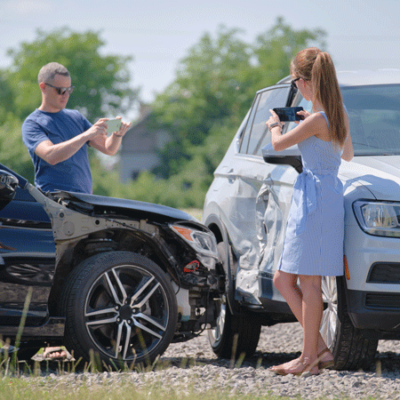
An introduction to motor vehicle accidents
No one wants to be in a car accident: cars are expensive to fix and the person at fault is not always obvious. There are two types of damages (or loss) in motor vehicle accidents, namely personal injury and property damage. Personal injury includes bruises, broken bones and even death, while property damage includes dents and scratches to a car. This article will focus on the concept of negligence and the initial steps you should take in the event of a car accident.
Negligence
The most common motor vehicle accident claim is brought in negligence. To prove negligence in Court, the plaintiff (person commencing court proceedings) must prove:
A) that the defendant owed the plaintiff a duty of care;
B) the defendant breached that duty; and
C) the plaintiff suffered damage from the breach of duty.
In the context of driving, all drivers owe a duty to other road users, their passengers, and pedestrians. Examples of where a driver breaches a duty of care include failing to keep a proper lookout; failing to maintain a safe stopping distance; and driving under the influence of drugs.
Initial steps
If you are involved in a motor vehicle accident, we suggest the following steps to be taken:
1.Stop and exchange details.
Under regulation 287 of the Road Rules 2014 (NSW), you must stop at the scene of the accident and share details about your name, address, vehicle registration number and any other information to identify the vehicle. It is important that you capture multiple pictures of the car damage for your own record. These pictures will not only become part of your evidence, but they will assist with determining who is at fault and the amount of damage. Obtaining the other driver’s mobile phone number is useful if you decide to seek compensation in the future.
Generally, you do not need to call the police unless someone is killed or injured in the accident; or the other driver did not stop and exchange details with you.
2.Contact your insurance provider.
Explain to your insurance provider about the details of the car accident and advise whether you would like to make a claim. Your level of cover will determine what action your insurance provider will take and how much money you can recover. The three most common types of insurance cover are:
– Comprehensive is the highest level of cover which covers the damage to your car and other cars regardless of fault.
– Third Party Property Damage only covers damage to other cars.
– Compulsory Third Party (also known as a Green Slip) only covers injuries or deaths from a car accident which you may be liable for.
3.Contact witnesses
Witnesses play a significant role in Court. You should contact any witnesses and obtain a statement while memories are still fresh. The effort needed to find them and seek their assistance is usually justified. Relevant details in the witness’ statement include date and time of collision; traffic conditions; and direction and speed of vehicles at point of impact. Witnesses who are neither relatives nor acquaintances to you are more readily believed in Court. Footage from your dash cam, if you have one, is also another valuable piece of evidence which will be considered in Court.
Conclusion
Proving negligence in respect of motor vehicle accidents is not always straight forward. If you only have Compulsory Third Party Insurance, then you should seek a lawyer to make a claim or defend against a claim. Our civil litigation team at Legal Point Lawyers has profound experience in motor vehicle accident claims so you can be assured that you will get the outcome you deserve.
Disclaimer: This publication is general information only and does not purport to provide legal advice. We do not accept responsibility for any losses for reliance upon this publication.

Ge Wu is the solicitor director of Legal Point Lawyers & Attorneys. He has been admitted to practise law since 2005. Throughout his practice, Ge Wu predominantly practises in the areas of Property Law, Immigration Law, Commercial Law, Civil Litigation and Family Law.
His experience covers all aspects of property law, commercial/retail lease, immigration law and civil litigation, while at the same time, he also has experience in family law, criminal law and other areas such as will-drafting and general advice.
He has frequently been instructed by corporate clients in pre-acquisition due diligence reports, structuring property development, land/shopping centre acquisitions, G.S.T. and stamp duty advice for buying/selling businesses, as well as share transfers and company re-structures.
Ge Wu has been appointed as Notary Public since 2011 and started to provide Notary Public service to clients from different cultural backgrounds.
Mobile: 0433539869
Email: ge.wu@legalpointlawyers.com.au

Daniel’s expertise spans civil litigation, criminal law and real property matters.
Daniel is noted for his experience in settling a complex family law matter concerning the division of matrimonial property. Furthermore, he has appeared in Courts across New South Wales for criminal matters ranging from traffic offences to assault charges to bail applications. Daniel also has extensive knowledge and experience to prepare and advise on commercial leases and contracts for the sale of land.
He has a keen interest in obtaining the best possible outcome for his clients in the most cost-efficient way. Clients appreciate Daniel’s responsiveness, business acumen and ability to deliver advice that is easy to understand.
Daniel holds a Bachelor of Laws and Bachelor of Commerce from the University of Sydney. He is a solicitor of the Supreme Court of New South Wales.
He is proficient in English and Cantonese.
